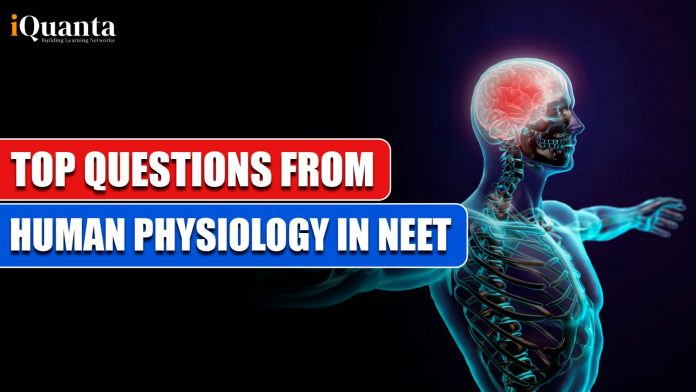The NEET UG 2025 exam is conducted for students seeking admission to undergraduate medical programs in the country. Aspirants must grasp all the NEET 2025 important questions to succeed in the exam. The NEET exam covers a broad syllabus with biology comprising a significant portion of the questions. Human Physiology is a crucial topic in the biology syllabus and requires dedicated study. In this article, we have compiled the top NEET 2025 important questions from the Human Physiology section to guide candidates in a detailed manner.
Enroll for NEET Online Coaching by iQuanta

Join the free NEET whatsapp group for latest NEET updates and other important information
NEET 2025 Important Questions- Important Topics from Human Physiology
Candidates must dedicate time to practice a wide range of questions and achieve mastery in human physiology. This can help them handle complex and tricky questions easily in the exam. Check the list of important human physiology topics prescribed in the NEET Biology syllabus below:
NEET Human Physiology Syllabus
| Topics | Sub-Topics |
| Breathing and Respiration | Respiratory organs in animals (recall only); Respiratory system in humans; Mechanism of breathing and its regulation in humans-Exchange of gases, transport of gases and regulation of respiration Respiratory volumes; Disorders related to respiration-Asthma, Emphysema, Occupational respiratory disorders. |
| Body fluids and circulation | Composition of blood, blood groups, coagulation of blood; Composition of lymph and its function; Human circulatory system-Structure of human heart and blood vessels; Cardiac cycle, cardiac output, ECG, Double circulation; Regulation of cardiac activity; Disorders of circulatory system-Hypertension, Coronary artery disease, Angina pectoris, Heart failure. |
| Excretory products and their elimination | Modes of excretion- Ammonotelism, ureotelism, uricotelism; Human excretory system-structure and function; Urine formation, Osmoregulation; Regulation of kidney function-Renin-angiotensin, Atrial Natriuretic Factor, ADH and Diabetes insipidus; Role of other organs in excretion; Disorders; Uraemia, Renal failure, Renal calculi, Nephritis; Dialysis and artificial kidney. |
| Locomotion and Movement | Types of movement- ciliary, fiagellar, muscular; Skeletal muscle- contractile proteins and muscle contraction; Skeletal system and its functions (To be dealt with the relevant practical of Practical syllabus); Joints; Disorders of muscular and skeletal system-Myasthenia gravis, Tetany, Muscular dystrophy, Arthritis, Osteoporosis, Gout. |
| Neural control and coordination | Neuron and nerves; Nervous system in humanscentral nervous system, peripheral nervous system and visceral nervous system; Generation and conduction of nerve impulse. |
| Chemical coordination and regulation | Endocrine glands and hormones; Human endocrine system-Hypothalamus, Pituitary, Pineal, Thyroid, Parathyroid, Adrenal, Pancreas, Gonads; Mechanism of hormone action (Elementary Idea); Role of hormones as messengers and regulators, Hypo-and hyperactivity and related disorders (Common disorders e.g. Dwarfism, Acromegaly, Cretinism, goiter, exopthalmic goiter, diabetes, Addison’s disease). |
Top NEET 2025 Important Questions from Human Physiology
Human Physiology is one of the crucial sections of the NEET Biology syllabus. Hence, aspirants must build a solid base to achieve high scores in these topics. To ease their preparation, we have compiled below the list of the top NEET 2025 important questions with answers from Human Physiology:
Q1. Which of the following hormones never reaches to the cytoplasm?
1. Estrogen
2. FSH
3. Progesterone
4. Testosterone
Ans. 2
Q2. The posterior pituitary gland is not a true endocrine gland because
1. It is provided with a duct
2. It only stores and releases hormones
3. It is under the regulation of hypothalamus
4. It secretes enzymes
Ans. 2
Q3. The blood calcium level is lowered by the deficiency of
1. thyroxine
2. calcitonin
3. parathormone
4. Both a and b
Ans. 3

Join the free NEET whatsapp group for latest NEET updates and other important information
Q4. Which of the following factors is not favourable for the formation of oxyhaemoglobin?
1. High pO₂
2. Low temperature
3. Less H+ concentration
4. High pCO₂
Ans. 4
Q5. A person breathes in some volume of air by forced inspiration after having a forced expiration. The quantity of air taken is
1. Total lung capacity
2. Tidal volume
3. Vital capacity
4. Inspiratory capacity
Ans. 3
Q6. A person suffers punctures in his chest cavity in an accident without any damage to the lungs. Its effect could be
1. Reduced Breathing Rate
2. Rapid increase in breathing rate
3. No change in respiration
4. Cessation of breathing
Ans. 4
Q7. Respiratory process is regulated by certain specialized centres in the brain. One of the following centres can reduce the inspiratory duration upon stimulation
1. Medullary inspiratory centre
2. Pneumotaxic centre
3. Apneustic centre
4. Chemosensitive centre
Ans. 2
Q8. Which one of the following blood cells is involved in antibody production?
1. B-Lymphocytes
2. T-Lymphocytes
3. RBC
4. Neutrophils
Ans. 1
Q9. What would be the cardiac output of a person having 72 heartbeats per minute and a stroke volume of 50 ml?
1. 360 mL
2. 3600 mL
3. 7200 mL
4. 5000 mL
Ans. 2
Q10. Which of the following is removed from our body by lungs?
1. CO₂ only
2. H₂O only
3. CO₂ and H₂O
4. Ammonia
Ans. 3
Q11. We can produce concentrated/dilute urine. This is facilitated by a special mechanism. Identify the mechanism
1. Reabsorption from PCT
2. Reabsorption from Collecting Duct
3. Reabsorption/Secretion in DCT
4. Counter Current Mechanism in Henle’s loop/Vasa recta
Ans. 4
Q12. Which one of the following is also known as antidiuretic hormone?
1. Oxytocin
2. Vasopressin
3. Adrenaline
4. Calcitonin
Ans. 2
Q13. Muscles with characteristics striations and involuntary are
1. Muscles in the wall of alimentary canal
2. Muscles of the heart
3. Muscles assisting locomotion
4. Muscles of the eyelids
Ans. 2
Q14. Knee joint and elbow joint are examples of
1. Saddle joint
2. Ball and socket joint
3. Pivot joint
4. Hinge joint
Ans. 4
Q15. ATPase of the muscle is located in
1. Actinin
2. Troponin
3. Myosin
4. Actin
Ans. 3
Q16. During depolarisation, the outer surface of the membrane becomes
1. Negatively charged
2. Positively charged
3. Neutrally charged
4. None of these
Ans. 1
Q17. Which of the following has H-shaped grey matter?
1. Cerebrum
2. Medulla oblongata
3. Cerebellum
4. Spinal Cord
Ans. 4
Q18. An area in the brain which is associated with strong emotions
1. Cerebral cortex
2. Cerebellum
3. Limbic system
4. Medulla
Ans. 3

FAQs – NEET 2025 Important Questions – Top Questions from Human Physiology
Aspirants can check the top NEET 2025 important questions from the human physiology topics in the article above.
Some of the NEET human physiology topics include breathing and respiration, body fluids, excretory products and their elimination, etc.
The NEET Biology section comprises a total of 90 questions for 360 marks.
Yes. Human Physiology is an important topic for NEET as it comprises questions in the medical entrance exam.

